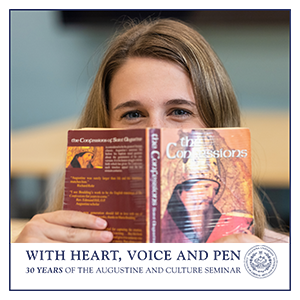Villanova’s Augustine and Culture Seminar Program Celebrates 30th Year

Villanova, PA – For the past three decades at Villanova, in small discussion-based seminars, first-year students have been perplexed by Plato, fired up by Fratelli Tutti and absorbed in St. Augustine's Confessions—while sharpening their critical reading, discussion and writing skills. It is a universal experience shared by all Villanova students—from Arts and Science majors to those pursuing degrees in Business, Engineering and Nursing—and it is often where the first Villanova memories are made.
The Augustine and Culture Seminar (ACS) is a two-semester, first-year seminar course rooted in Augustinian and Catholic intellectual traditions that equips students with the academic tools necessary for success at Villanova and beyond. ACS celebrates its 30th anniversary this academic year with special events and commemorative moments including a marquee lecture this fall.
The featured speaker is Roosevelt Montás, PhD, senior lecturer in American Studies and English, Columbia University. Dr. Montás is director of Columbia’s Center for American Studies’ Freedom and Citizenship Program in collaboration with its Double Discovery Center. He speaks and writes on the history, meaning and the future of liberal education. He is author of Rescuing Socrates: How the Great Books Changed My Life and Why They Matter for a New Generation (Princeton University Press, 2021). The first chapter of the book recounts his own encounter with St. Augustine’s Confessions in the first semester of his first year of college. The lecture, titled after his newest book, will take place on Wednesday, Nov. 2 at 6 p.m. in the Topper Theatre of The Joan and Joan Mullen Center for the Performing Arts. The event is open to the public and registration is required.
For students at Villanova, ACS—originally called Core Humanities—is a quintessential liberal arts experience, exposing them to some of the most significant texts and transformative ideas in human culture and to the perennial debates that have shaped the diverse, global intellectual culture we live in today. Founded and housed in the College of Liberal Arts and Sciences, it is designed to provide a foundation of studies in the humanities and helps students see the interconnections between the various disciplines—an experience they can build upon in their major field of study and in their electives.
“For 30 years, all Villanova students have been connected by this shared experience; because we all have read Augustine’s Confessions we groan when someone quips about not succumbing to ‘pear pressure’ or—more seriously—we feel gratitude when we reflect on the meaning and significance of family and friends in our lives. The seeds of many enduring friendships and even a few marriages were planted in that first year of learning together while taking ACS,” says Gregory D. Hoskins, PhD, director, Augustine and Culture Seminar Program. He gives credit to his predecessor, Marylu Hill, PhD, teaching professor, Augustine and Culture Seminar Program, who served as the ACS director for eleven years. “Dr. Hill helped build the foundation that has made the ACS experience so successful and so special.”
For 30 years, Villanova students have found the latter to be true.
“I believe we were studying a work by Plato, and out of nowhere my professor, Dr. John Immerwahr, jumped on the table and started yelling ‘Bacchus Evohe!’ He then made us all get on the table in the seminar room and start yelling the same thing,” recalls Katie Czajkowski ’05 CLAS. “Professors from down the hall came running, threw open the door and found us all standing on the table yelling quotes from Plato! I will never forget that day.”
Caitlin St. Armour ’15 CLAS remembers, “I was fortunate enough to take ACS with Professor Peter Busch. He was a lively professor who clearly cared about his students. Honestly, I thought the entire year was wonderful, and I'm sure my class would say the same, but the classes we had outside were my favorites. Those sessions at different spots around campus allowed us all to take in where we were physically as well as what point in our lives we had arrived at.”
The special Nov. 2 anniversary lecture is co-sponsored by the ACS program, the Augustinian Institute and the College of Liberal Arts and Sciences Dean’s Office.
About Villanova University’s College of Liberal Arts and Sciences: Since its founding in 1842, Villanova University’s College of Liberal Arts and Sciences has cultivated knowledge, understanding and intellectual courage for a purposeful life in a challenging and changing world. With more than 40 majors across the humanities, social sciences and natural sciences, it is the oldest and largest of Villanova’s colleges, serving more than 4,500 undergraduate and graduate students each year. The College is committed to a teacher-scholar model, offering outstanding undergraduate and graduate research opportunities and a rigorous core curriculum that prepares students to become critical thinkers, strong communicators and ethical leaders with a truly global perspective.
